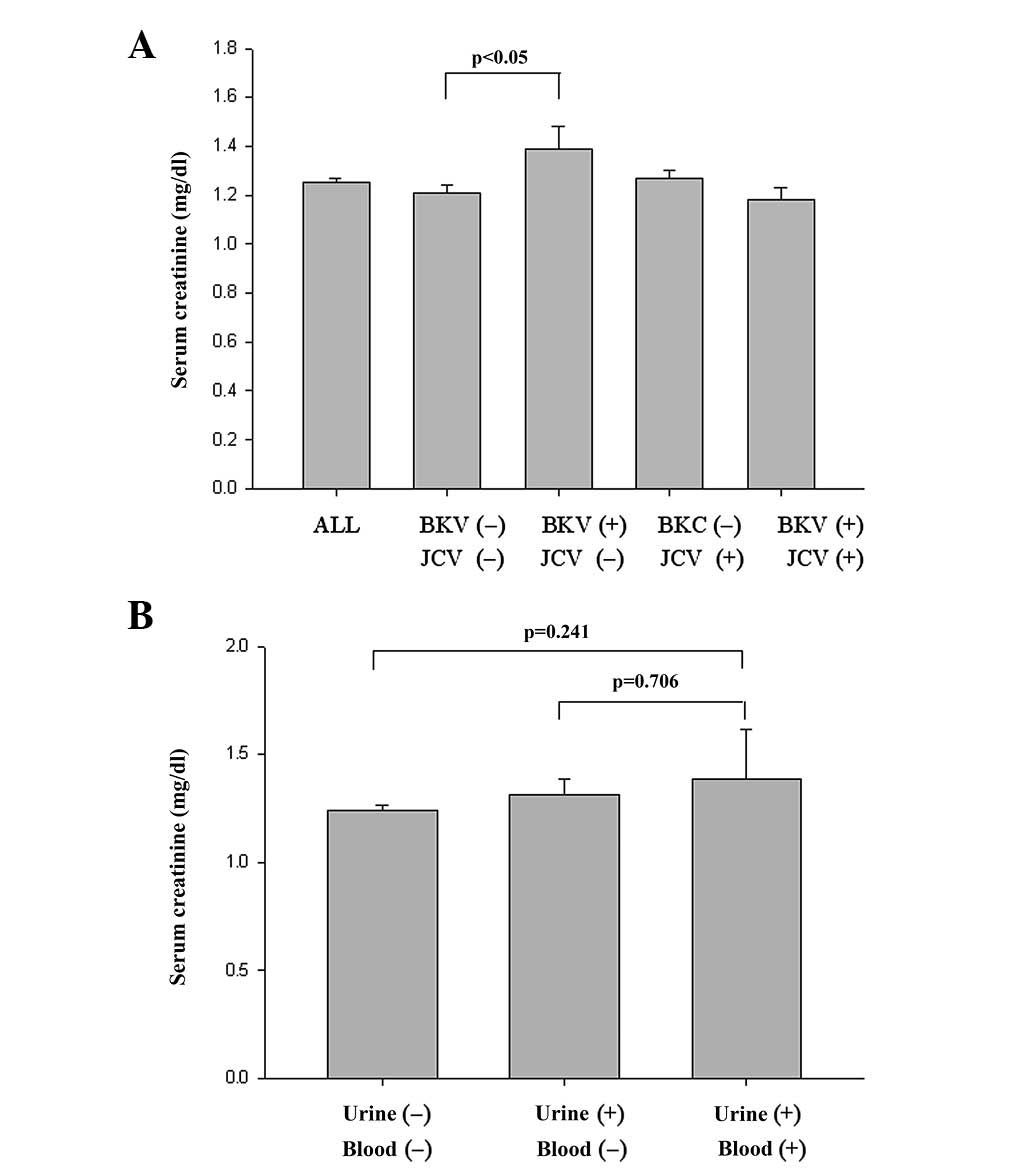|
1
|
Eash S, Manley K, Gasparovic M, Querbes W
and Atwood WJ: The human polyomaviruses. Cell Mol Life Sci.
63:865–876. 2006. View Article : Google Scholar
|
|
2
|
Gardner SD, Field AM, Coleman DV and Hulme
B: New human papovavirus (B.K.) isolated from urine after renal
transplantation. Lancet. 1:1253–1257. 1971. View Article : Google Scholar : PubMed/NCBI
|
|
3
|
Padgett BL, Walker DL, ZuRhein GM,
Eckroade RJ and Dessel BH: Cultivation of papova-like virus from
human brain with progressive multifocal leucoencephalopathy.
Lancet. 1:1257–1260. 1971. View Article : Google Scholar : PubMed/NCBI
|
|
4
|
Zu Rhein G and Chou SM: Particles
resembling papovaviruses in human cerebral demyelinating disease.
Science. 148:1477–1479. 1965.PubMed/NCBI
|
|
5
|
Zu Rhein GM: Polyoma-like virions in a
human demyelinating disease. Acta Neuropathol. 8:57–68.
1967.PubMed/NCBI
|
|
6
|
Goudsmit J, Wertheim-van Dillen P, van
Strien A and van der Noordaa J: The role of BK virus in acute
respiratory tract disease and the presence of BKV DNA in tonsils. J
Med Virol. 10:91–99. 1982. View Article : Google Scholar : PubMed/NCBI
|
|
7
|
Moret H, Guichard M, Matheron S, et al:
Virological diagnosis of progressive multifocal
leukoencephalopathy: detection of JC virus DNA in cerebrospinal
fluid and brain tissue of AIDS patients. J Clin Microbiol.
31:3310–3313. 1993.
|
|
8
|
Sundsfjord A, Spein A, Lucht E, Flaegstad
T, Seternes OM and Traavik T: Detection of BK virus DNA in
nasopharyngeal aspirates from children with respiratory infections
but not in saliva from immunodeficient and immunocompetent adult
patients. J Clin Microbiol. 32:1390–1394. 1994.PubMed/NCBI
|
|
9
|
Chesters PM, Heritage J and McCance DJ:
Persistence of DNA sequences of BK virus and JC virus in normal
human tissues and in diseased tissues. J Infect Dis. 147:676–684.
1983. View Article : Google Scholar : PubMed/NCBI
|
|
10
|
Elsner C and Dörries K: Evidence of human
polyomavirus BK and JC infection in normal brain tissue. Virology.
191:72–80. 1992. View Article : Google Scholar : PubMed/NCBI
|
|
11
|
Purighalla R, Shapiro R, McCauley J and
Randhawa P: BK virus infection in a kidney allograft diagnosed by
needle biopsy. Am J Kidney Dis. 26:671–673. 1995. View Article : Google Scholar : PubMed/NCBI
|
|
12
|
Chen CH, Wen MC, Wang M, et al: A
regulatory region rearranged BK virus is associated with
tubulointerstitial nephritis in a rejected renal allograft. J Med
Virol. 64:82–88. 2001. View
Article : Google Scholar : PubMed/NCBI
|
|
13
|
Petrogiannis-Haliotis T, Sakoulas G, Kirby
J, et al: BK-related polyomavirus vasculopathy in a
renal-transplant recipient. N Engl J Med. 345:1250–1255. 2001.
View Article : Google Scholar
|
|
14
|
de Bruyn G and Limaye AP: BK
virus-associated nephropathy in kidney transplant recipients. Rev
Med Virol. 14:193–205. 2004.
|
|
15
|
Boldorini R, Brustia M, Veggiani C, et al:
Periodic assessment of urine and serum by cytology and molecular
biology as a diagnostic tool for BK virus nephropathy in renal
transplant patients. Acta Cytol. 49:235–243. 2005. View Article : Google Scholar
|
|
16
|
Kasiske BL, Snyder JJ, Gilbertson D and
Matas AJ: Diabetes mellitus after kidney transplantation in the
United States. Am J Transplant. 3:178–185. 2003. View Article : Google Scholar
|
|
17
|
Boudreaux JP, McHugh L, Canafax DM, et al:
The impact of cyclosporine and combination immunosuppression on the
incidence of posttransplant diabetes in renal allograft recipients.
Transplantation. 44:376–381. 1987. View Article : Google Scholar
|
|
18
|
Sumrani NB, Delaney V, Ding ZK, et al:
Diabetes mellitus after renal transplantation in the cyclosporine
era - an analysis of risk factors. Transplantation. 51:343–347.
1991. View Article : Google Scholar : PubMed/NCBI
|
|
19
|
Cimbaluk D, Pitelka L, Kluskens L and
Gattuso P: Update on human polyomavirus BK nephropathy. Diagn
Cytopathol. 37:773–779. 2009. View
Article : Google Scholar : PubMed/NCBI
|
|
20
|
Hariharan S: BK virus nephritis after
renal transplantation. Kidney Int. 69:655–662. 2006. View Article : Google Scholar : PubMed/NCBI
|
|
21
|
Studahl M: Influenza virus and CNS
manifestations. J Clin Virol. 28:225–232. 2003. View Article : Google Scholar : PubMed/NCBI
|
|
22
|
Khalili K, Gordon J and White MK: The
polyomavirus, JCV and its involvement in human disease. Adv Exp Med
Biol. 577:274–287. 2006. View Article : Google Scholar : PubMed/NCBI
|
















